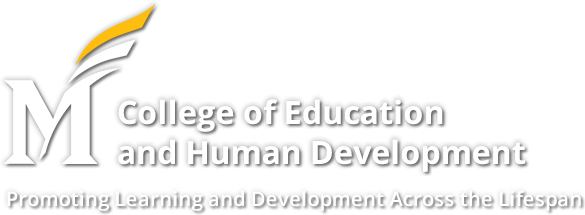College of Education and Human Development
Multidisciplinary Self-Study of Teaching Goes to Korea
May 26, 2016

Dr. Anastasia Samaras at Mason Korea Campus
What happens when you gather a group of faculty from various disciplines to study their teaching practice? That’s exactly what Dr. Anastasia Samaras, a pedagogical scholar and self-study research methodologist from the College of Education and Human Development at George Mason University, did at the Mason Korea campus and also at four other universities in Korea during her awarded spring study leave.
Regardless of discipline, instructors have the common goal of advancing their teaching to improve student learning and students are the center of George Mason University. Since Mason Korea is a relatively new campus, faculty are as some noted, "a program of one" so many instructors were eager to collect around their common goal of improving their teaching. Professor Samaras’ visit, sponsored by Mason Korea, included interactive workshops and individual consultations over a week long period. The initiative holds the potential to seed possibilities for a professional learning community with faculty reciprocal learning as "critical friends".

Dr. Anastasia Samaras giving keynote at Jeonnam National University
Samaras’ work at Mason Korea builds on earlier transdisciplinary self-study teaching/research projects which she has led and co-facilitated at George Mason University since 2010 spearheaded by the Center for Faculty and Teaching Excellence. She currently serves as a co-facilitator of a third faculty development cohort, Self-Study Scholars’ Collaborative (S3C) on the Visually Rich Digital Learning Environment with Lynne Scott Constantine, School of Art, and Lesley Smith in Higher Education and College of Humanities and Social Sciences.
Samaras is also serving as Co-PI on two NSF sponsored grants as educational researcher and leading a faculty self-study Teacher Inquiry Group of STEM faculty.
These transdisciplinary projects not only demonstrate the pedagogic and academic value of self-study of teaching within communities of learning, but offer a unique avenue for faculty development and innovative productivity across numerous programs and Colleges and with a multiplier effect as the research and new pedagogies are presented and published in multiple and diverse venues. The projects highlight the importance of Mason campuses supporting and rewarding innovation and initiatives as a nexus of grassroots change and institutional renewal.

Dr. Anastasia Samaras with colleagues from Ewha Womans University and Mason Korea
While in Korea, Samaras was also invited to give a series of keynote talks and workshops at universities. She spoke at Jeonnam National University, March 23; at Cheongju National University, March 24; at Seoul National University, March 25, and at Ewha Womans University, April 2.
There has been a keen interest in the self-study methodology by faculty at numerous universities in Korea with two of Samaras’ books (2006 & 2011) translated into Korean. In 2013, she was interviewed by a team of six Korean scholars; two were visiting scholars to GMU translating her 2011 book, Self-Study of Teacher Research. Their goal was to make available innovate teaching practices in a society moving towards more sociocultural pedagogical practices.
Samaras’ work in self-study scholarship on an international has also included: a Fulbright Scholarship in 2012, where she worked with faculty at the University of Ioannina, Greece to explore self-study research for co-teachers, or special education teachers working with general education teachers. She also gave keynote addresses at Beijing Normal University in 2012, at the University of KwaZulu-Natal in Durban in 2012 and 2014, and will speak at Hibernia College, Dublin in November.
For Samaras, her work in Korea provided an opportunity to enact, assess, and research her design of teaching and facilitating self-study which she has been conducting with self-study colleagues (Lunenberg & Samaras, 2014; Pithouse-Morgan & Samaras, 2014; Samaras 2013; Samaras, et al, 2015). As she remarks, "I’m still learning about my practice and am grateful for these professional opportunities with colleagues around the globe."
